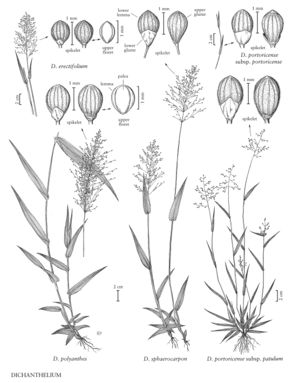familyPoaceae
subfamilyPoaceae subfam. Panicoideae
genusDichanthelium
speciesDichanthelium portoricense
Difference between revisions of "Dichanthelium portoricense subsp. portoricense"
Treatment appears in FNA Volume 25. Treatment on page 442.
FNA>Volume Importer |
imported>Volume Importer |
||
| (5 intermediate revisions by 2 users not shown) | |||
| Line 1: | Line 1: | ||
{{Treatment/ID | {{Treatment/ID | ||
|accepted_name=Dichanthelium portoricense subsp. portoricense | |accepted_name=Dichanthelium portoricense subsp. portoricense | ||
| − | |accepted_authority= | + | |accepted_authority= |
|publications= | |publications= | ||
|basionyms= | |basionyms= | ||
| Line 15: | Line 15: | ||
-->{{Treatment/Body | -->{{Treatment/Body | ||
| − | |discussion=<p><i>Dichanthelium portoricense </i>subsp.<i> portoricense</i> is more common than < | + | |discussion=<p><i>Dichanthelium portoricense </i>subsp.<i> portoricense</i> is more common than <i></i>subsp.<i> patulum</i> in coastal sand dunes. It also grows in sandy pinelands and savannahs. It resembles <i>D. aciculare</i> somewhat, but that species usually has ascending-pilose culms, strongly involute or acicular blades, and longer spikelets.</p> |
|tables= | |tables= | ||
|references= | |references= | ||
| Line 24: | Line 24: | ||
-->{{#Taxon: | -->{{#Taxon: | ||
name=Dichanthelium portoricense subsp. portoricense | name=Dichanthelium portoricense subsp. portoricense | ||
| − | + | |authority= | |
| − | |authority= | ||
|rank=subspecies | |rank=subspecies | ||
|parent rank=species | |parent rank=species | ||
| Line 31: | Line 30: | ||
|basionyms= | |basionyms= | ||
|family=Poaceae | |family=Poaceae | ||
| + | |illustrator=Linda A. Vorobik;Hana Pazdírková | ||
| + | |illustration copyright=Utah State University | ||
|reference=None | |reference=None | ||
|publication title= | |publication title= | ||
|publication year= | |publication year= | ||
|special status= | |special status= | ||
| − | |source xml=https:// | + | |source xml=https://bitbucket.org/aafc-mbb/fna-data-curation/src/200273ad09963decb8fc72550212de541d86569d/coarse_grained_fna_xml/V25/V25_1202.xml |
|subfamily=Poaceae subfam. Panicoideae | |subfamily=Poaceae subfam. Panicoideae | ||
|tribe=Poaceae tribe Paniceae | |tribe=Poaceae tribe Paniceae | ||
Latest revision as of 17:56, 11 May 2021
Culms 15-40 cm, glabrous or puberulent. Sheaths glabrous or puberulent; cauline blades 2-5 cm long, 2.5-4.5 mm wide, usually puberulent abaxially and glabrous adaxially. Primary panicles 2-4.5 cm. Spikelets 1.5-2.0 mm, puberulent to nearly glabrous.
Discussion
Dichanthelium portoricense subsp. portoricense is more common than subsp. patulum in coastal sand dunes. It also grows in sandy pinelands and savannahs. It resembles D. aciculare somewhat, but that species usually has ascending-pilose culms, strongly involute or acicular blades, and longer spikelets.
Selected References
None.
Lower Taxa
None.
... more about "Dichanthelium portoricense subsp. portoricense"
Minn. +, Conn. +, N.J. +, N.Y. +, Wash. +, Ala. +, Mich. +, N.C. +, Pa. +, Puerto Rico +, S.C. +, W.Va. +, Ark. +, Iowa +, Kans. +, Mo. +, N.Dak. +, Nebr. +, Okla. +, S.Dak. +, Del. +, D.C +, Wis. +, Alta. +, B.C. +, Man. +, N.B. +, Nfld. and Labr. (Labr.) +, N.S. +, Ont. +, P.E.I. +, Que. +, Sask. +, Pacific Islands (Hawaii) +, Md. +, Mass. +, Maine +, N.H. +, R.I. +, Vt. +, Fla. +, Wyo. +, Miss. +, Ariz. +, N.Mex. +, Tex. +, La. +, Ga. +, Tenn. +, Calif. +, Nev. +, Colo. +, Ill. +, Ind. +, Va. +, Idaho +, Ohio +, Utah +, Mont. +, Oreg. + and Ky. +
Present +
Dichanthelium portoricense subsp. portoricense +
Dichanthelium portoricense +
subspecies +
